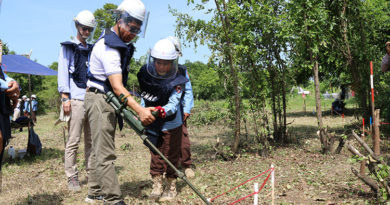CLIMATE CHANGE: GLASGOW, SCOTLAND- Over 100 countries vow to end deforestation at climate talks
The sun rises over the River Clyde outside the venue of the COP26 UN Climate Summit in Glasgow, Scotland. PHOTO: AP
.

GLASGOW, SCOTLAND (AP) – Over 100 countries pledged yesterday to end deforestation in the coming decade – a promise that experts said would be critical to limiting climate change but one that has been made and broken before.
The United Kingdom (UK) hailed the commitment as the first big achievement of the United Nations (UN) climate conference known as COP26 taking place this month in the Scottish city of Glasgow. But campaigners said they need to see the details to understand its full impact.
The UK government said it has received commitments from leaders representing more than 85 per cent of the world’s forests to halt and reverse deforestation by 2030. Among them are several countries with massive forests, including Brazil, China, Colombia, Congo, Indonesia, Russia and the United States.
More than USD19 billion in public and private funds have been pledged toward the plan.
British Prime Minister Boris Johnson said that “with today’s unprecedented pledges, we will have a chance to end humanity’s long history as nature’s conqueror, and instead become its custodian”.
Forests are important ecosystems and provide a critical way of absorbing carbon dioxide – the main greenhouse gas – from the atmosphere. Trees are one of the world’s major so-called carbon sinks, or places where carbon is stored.
But the value of wood as a commodity and the growing demand for agricultural and pastoral land are leading to widespread and often illegal felling of forests, particularly in developing countries.
Experts cautioned that similar agreements in the past have failed to be effective.
Alison Hoare, a senior research fellow at political think tank Chatham House, said world leaders promised in 2014 to end deforestation by 2030, “but since then deforestation has accelerated across many countries”.
“This new pledge recognises the range of actions needed to protect our forests, including finance, support for rural livelihoods, and strong trade policies,” she said.
“For it to succeed, inclusive processes and equitable legal frameworks will be needed, and governments must work with civil society, businesses and indigenous peoples to agree, monitor and implement them.”












